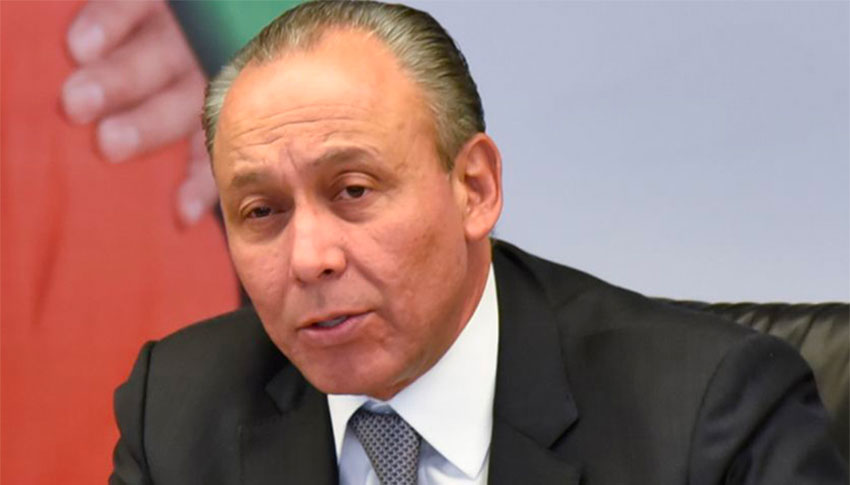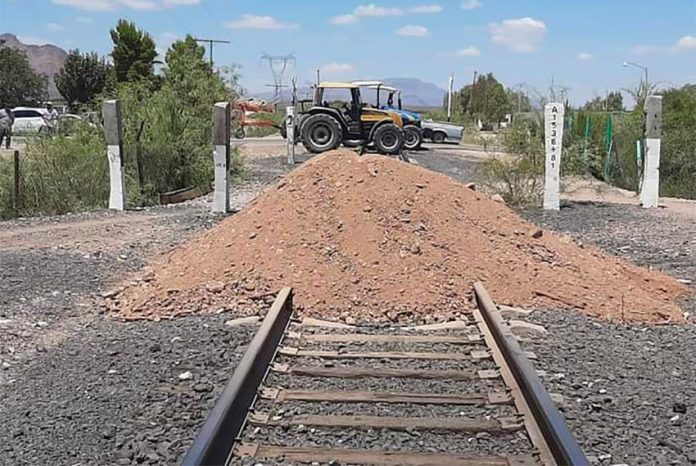Protests in Chihuahua over a 1944 water treaty with the United States are paralyzing sectors of the economy as farmers and ranchers angry over the deviation of water have blocked railway tracks in Meoqui since August 26, costing Mexican industry some US $10 billion.
The railway, which has been blocked by mounds of dirt and heavy equipment, is an essential thoroughfare between the United States and Mexico.
Francisco Santini Ramos, president of the Chihuahua office of the national Business Coordinating Council (CCE), said that in the absence of an alternative that allows the transit of vital cargo, it is urgent that tracks be cleared
“It would be very difficult to change the shipments because that would mean using almost 20,000 trucks to move the merchandise and there are neither the conditions nor the infrastructure to make these changes,” he said. “The path is dialogue and unblocking the railway tracks.”
He said the situation has impacted the automotive, cement, food and beer industries in central Mexico that routinely ship their products north via rail through Ciudad Juárez, the second most important border crossing in the exchange of trade between the United States and Mexico.

Santini said the CCE has requested intervention by both the state and federal governments. Chihuahua Governor Javier Corral and Foreign Minister Marcelo Ebrard have been asked to resolve the water crisis and put an end to the blockade.
The Confederation of Industrial Chambers (Concamin) and the Mexican Railway Association (AMF) report that train shipments through Chihuahua are essential for national logistics due to the state’s strategic location and the importance of its agro-industrial sector for the country’s economy.
The conflict between farmers and the federal government exploded last week at the La Boquilla dam in San Francisco de Conchos and later claimed two victims.
A man and a woman who were protesting at the dam last Tuesday when it was stormed by farmers wielding Molotov cocktails, sticks and rocks were found shot in their pickup truck in the nearby city of Delicias that night.
The woman, Yessica Silva, died at the scene and her husband, Jaime Torres, was sent to the hospital in serious condition with gunshot wounds to the chest and neck. Witnesses say they were fired on by the National Guard.
President López Obrador asked the Attorney General’s Office to investigate the incidents at the dam which he says were instigated by his political opponents.
The federal government took further action against protesters through the Financial Intelligence Unit (UIF) of the Ministry of Finance. It froze the accounts of three officials singled out for being behind the Boquilla dam protests, former Chihuahua governor José Reyes Baeza, Delicias Mayor Eliseo Compeán Fernández and Chihuahua Irrigation Association President Salvador Alcántar.
In addition, 44 bank accounts belonging to the municipality of Delicias were frozen, according to the mayor.
The UIF said it froze the accounts of ex-governor Reyes in connection with the suspected embezzlement of 129 million pesos while Reyes was head of the state workers health service, ISSSTE, during the administration of former president Enrique Peña Nieto.
It denied freezing the accounts of the municipality of Delicias.
Both Reyes and Mayor Compeán called the move political persecution.
Source: T21 (sp)
